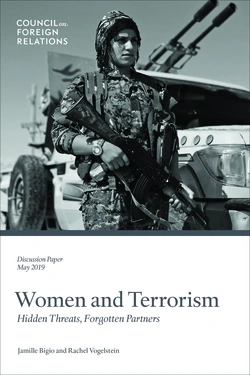
Women and Terrorism
Hidden Threats, Forgotten Partners

U.S. policymakers overlook the roles that women play in violent extremism—including as perpetrators, mitigators, and victims—and rarely enlist their participation in efforts to combat radicalization. This omission puts the United States at a disadvantage.
- Report
Extremist groups rely upon women to gain strategic advantage, recruiting them as facilitators and martyrs while also benefiting from their subjugation. Yet U.S. policymakers overlook the roles that women play in violent extremism—including as perpetrators, mitigators, and victims—and rarely enlist their participation in efforts to combat radicalization. This omission puts the United States at a disadvantage in its efforts to prevent terrorism globally and within its borders.
Women fuel extremists’ continued influence by advancing their ideology online and by indoctrinating their families. New technology allows for more sophisticated outreach, directly targeting messages to radicalize and recruit women. It also provides a platform on which female extremists thrive by expanding their recruitment reach and taking on greater operational roles in the virtual sphere. The failure of counterterrorist efforts to understand the ways in which women radicalize, support, and perpetrate violence cedes the benefit of their involvement to extremist groups.
More on:
Omitting women from terrorism prevention efforts also forfeits their potential contributions as mitigators of extremism. Women are well positioned to detect early signs of radicalization, because fundamentalists often target women’s rights first. As security officials, women provide insights and information that can be mission critical in keeping the peace. And because of their distinctive access and influence, women are crucial antiterrorism messengers in schools, religious institutions, social environments, and local government. Overlooking the contributions women can make to prevent extremism renders the United States less secure.
Many extremist groups promote an ideology that classifies women as second-class citizens and offers strategic and financial benefits through women’s subjugation. Boko Haram, the Islamic State, al-Qaeda, al-Shabab, and other groups use sexual violence to terrorize populations into compliance, displace civilians from strategic areas, enforce unit cohesion among fighters, and even generate revenue through trafficking. Suppressing women’s rights also allows extremists to control reproduction and harness female labor.
U.S. government policy and programs continue to underestimate the important roles women can play as perpetrators, mitigators, or targets of violent extremism. The Donald J. Trump administration should take steps to help the United States and its allies respond effectively to the security threat posed by violent extremism and advance U.S. peace and stability.
Professors: To request an exam copy, contact [email protected]. Please include your university and course name.
Bookstores: To order bulk copies, please contact Ingram. Visit https://ipage.ingramcontent.com, call 800.937.8200, or email [email protected]. Include ISBN: 978-0-87609-766-3.
More on:
 Online Store
Online Store